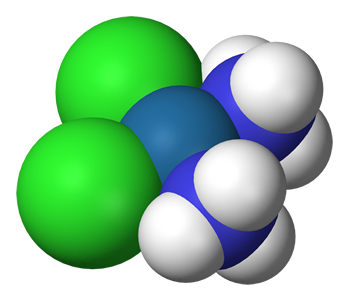[breadcrumb]
The chemotherapy drug cisplatin is used to treat a broad range of cancers, often in combination with other chemotherapy drugs. It is marketed under the brand name of Platinol or Platinol-AQ in the US. Cisplatin has generic counterparts for sale in the US, often sold simply under the drug’s true name.
Conditions that cisplatin treats include bladder, ovarian, head, neck, testicular, and non-small cell lung cancer.[1] It is also often used in combination with gemcitabine or pemetrexed to treat malignant mesothelioma.
Cisplatin is categorized as an “alkylating agent” chemotherapy drug, meaning that it can interfere with the cellular process of repairing DNA or preparing it for replication. In effect, these drugs attach to the base guanine molecule of DNA in order to prevent the strands from combining in their typical anti-parallel fashion.[2] The DNA strands can then break, making cellular repair and replication impossible for tumor cells.
The name cisplatin refers to it containing the substance cis-diamminedichloroplatinum(II) or cisplatinum.[3] Other forms of experimental platinum-based chemotherapy drugs are currently being used in clinical trials.
Cisplatin acts as a disruptor of the resting phase of the cancer cell, meaning they are not dependant on cellular replication occuring in order to be active.[4] This characteristic allows it to work in combination with other drugs, like gemcitabine or pemetrexed, which target the cell’s replication process more directly.
During treatment, cisplatin will be administered intravenously, most likely.[5] Dosage is administered depending on your weight, the progression of your condition, the use of other chemotherapy drugs, and other factors.
Common side effects of cisplatin can include:
- Mild to severe nausea and vomiting
- Temporary hair loss
- Loss of ability to taste foods
- Diarrhea
- Hiccups
- Dark urine
- Dry mouth
- Dry skin
- Decreased sweating
- Recurring dehydration
Additionally, cisplatin can interact with other drugs and supplements, such as pyridoxine (Vitamin B6), so be sure to communicate with your doctor if you plan on taking the drug for cancer treatment.
[1] https://www.cancer.gov/about-cancer/treatment/drugs/cisplatin
[2] https://www.drugs.com/drug-class/alkylating-agents.html
[3] https://www.ncbi.nlm.nih.gov/pmc/articles/PMC4146684/
[4] http://chemocare.com/chemotherapy/drug-info/cisplatin.aspx
[5] https://www.macmillan.org.uk/information-and-support/treating/chemotherapy/drugs-and-combination-regimens/individual-drugs/cisplatin.html

